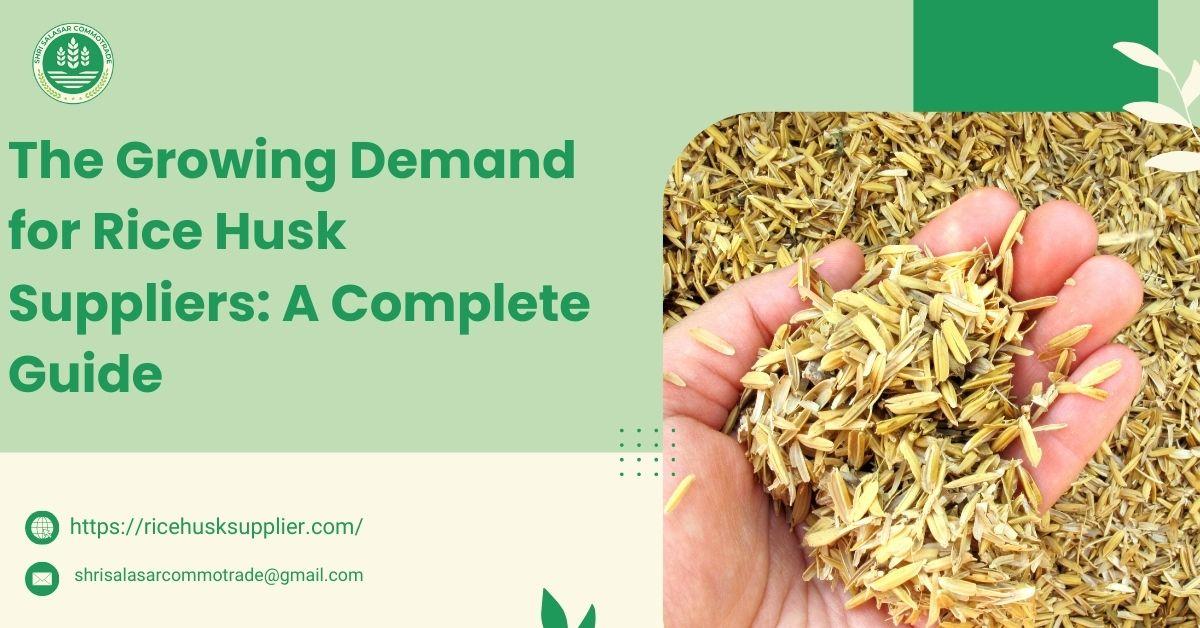Notifications

7 minutes, 56 seconds
-34 Views 0 Comments 0 Likes 0 Reviews

Rice is one of the most widely consumed staple foods around the world, especially in countries like India, China, and Southeast Asia. But what many people don’t know is that for every grain of rice harvested, there is a byproduct: rice husk.
Rice husk, also known as rice hulls, is the outer shell that protects the rice grain. Once the rice is harvested, the husk is separated from the edible grain and typically discarded. However, in recent years, rice husk suppliers have become an essential part of many industries due to the growing recognition of rice husk’s versatility and eco-friendly benefits.
Rice husk is the tough, fibrous outer covering of the rice grain that is removed during the milling process. It is usually discarded as waste, but this byproduct is actually quite valuable due to its unique properties.
Rice husk is rich in silica, lignin, cellulose, and ash, making it an excellent material for various applications. It's lightweight, durable, and can be processed into several useful products. The husk is typically brown or beige in color and can be seen around the rice grain when it is harvested.
Rice husk suppliers play a key role in ensuring that this valuable resource is available to different industries. These suppliers source rice husk from rice mills and farmers, collect, process, and then sell it to industries that require it for manufacturing products or generating energy.
Without suppliers, the rice husk would either be discarded as waste or go unused, which would waste the potential benefits it offers. Suppliers ensure that rice husk is used efficiently and sustainably by making it available in bulk to businesses, manufacturers, and even research institutes.
The versatility of rice husk makes it an essential component for many industries. Let's explore how rice husk is used in various sectors.
Rice husk is a great source of renewable energy. It is often used in the form of biomass for energy production, specifically in the form of rice husk pellets or briquettes. These husk-based pellets are burned in boilers to generate heat and electricity.
In fact, many rice mills have installed their own rice husk power plants to produce electricity from rice husk. By using rice husk to produce energy, these mills are reducing their reliance on traditional fossil fuels, making it an environmentally friendly alternative.
As a result, rice husk suppliers are crucial in supporting the clean energy industry by providing a sustainable, renewable resource for power generation.
Rice husk is commonly used in agriculture as a soil conditioner or organic mulch. The husks help retain moisture in the soil and reduce the need for frequent irrigation. Additionally, rice husk is rich in nutrients that can improve soil fertility, making it an ideal addition to organic farming.
Rice husk is also used to manufacture bio-fertilizers, which help enhance crop yields and promote healthy plant growth. Rice husk ash, a byproduct of burning rice husk, is a rich source of potassium, which is vital for plant growth.
Farmers rely on rice husk suppliers to provide them with high-quality husk for these applications, which helps improve the overall productivity and sustainability of their farms.
Rice husk is being increasingly used in the construction industry due to its lightweight and insulating properties. When combined with cement or concrete, rice husk can be used to create eco-friendly building materials such as rice husk ash concrete and rice husk boards.
These materials are not only strong and durable, but they also provide excellent insulation, reducing energy costs in buildings. Additionally, rice husk-based products are a sustainable alternative to traditional construction materials, making them highly attractive to environmentally conscious builders.
Rice husk suppliers are in high demand as the construction industry increasingly seeks green building solutions.
Rice husk is used in the production of various consumer goods and industrial products. Some common products made from rice husk include:
Rice husk-based paper: Instead of using wood, rice husk can be used to make eco-friendly paper.
Rice husk charcoal: This is used in grilling and as a filter for air and water purification.
Rice husk-based plastic alternatives: In an effort to reduce plastic waste, some companies use rice husk to create sustainable packaging materials.
As a renewable resource, rice husk offers manufacturers an alternative to traditional raw materials, making it an attractive option for those looking to create more sustainable products.
Rice husk is sometimes used as an ingredient in animal feed. When processed and mixed with other feed components, rice husk provides fiber and nutrients that are beneficial for livestock like cattle, poultry, and pigs. The husk helps improve digestion and is a cheap, sustainable alternative to other sources of fiber in animal feed.
Suppliers provide rice husk to farmers and feed manufacturers in large quantities to ensure that the animals receive the necessary nutrients for healthy growth.
Rice husk may have once been seen as waste, but today it’s recognized as a valuable resource with numerous applications across different industries. Whether it’s providing sustainable energy, improving agricultural productivity, or contributing to the construction of eco-friendly buildings, rice husk is playing an important role in promoting sustainability and reducing the environmental impact of various industries.
For businesses and industries seeking to make environmentally conscious choices, rice husk suppliers are key players in ensuring that this resource is put to its best use. By working with reliable suppliers, industries can access this versatile byproduct and use it to create eco-friendly products, energy, and solutions that benefit both the environment and the economy.

